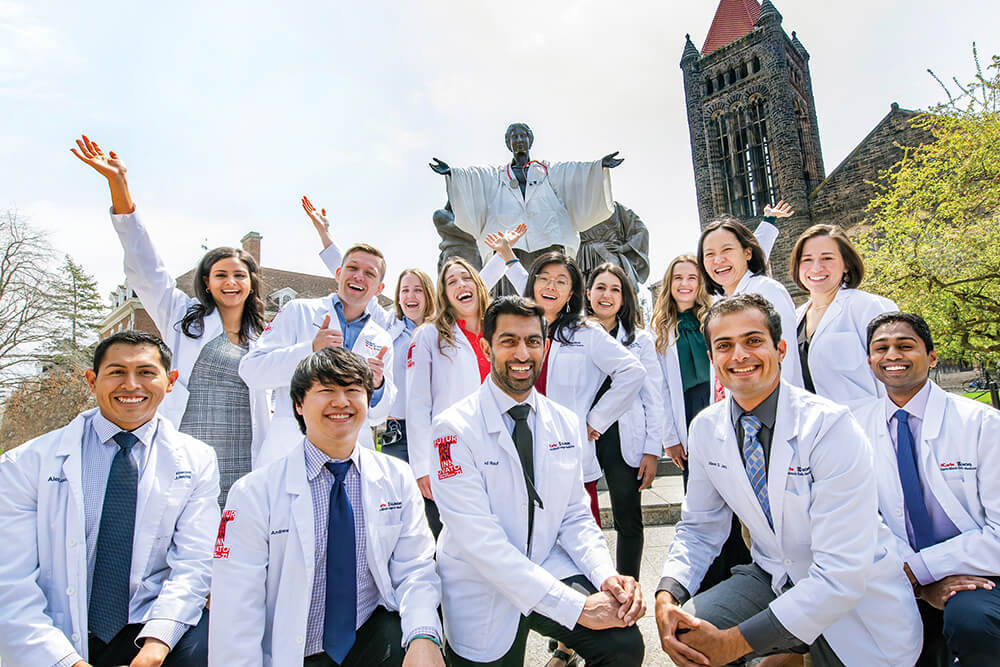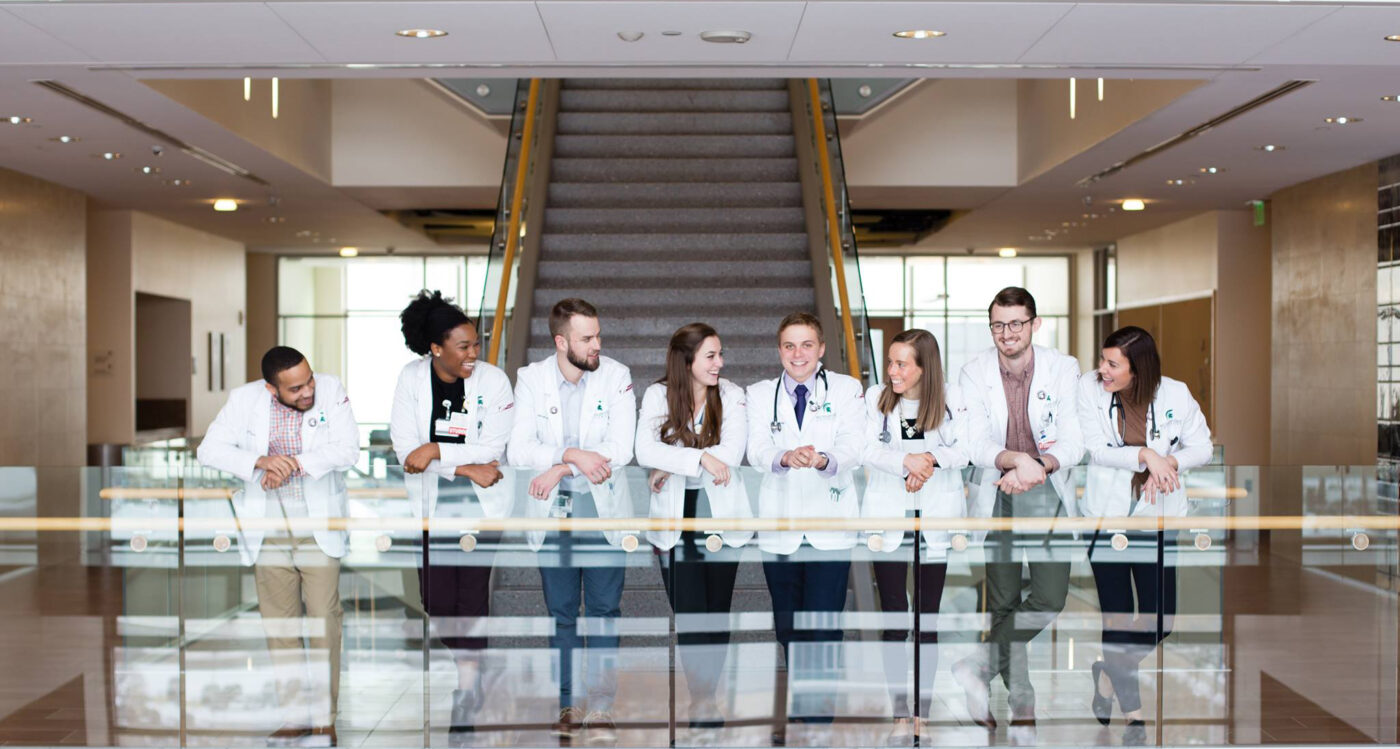If You Dream About Becoming a Doctor…
If you dream about becoming a doctor, you probably know that getting accepted into medical school — any school, let alone your dream school — can be a complicated journey. A medical school acceptance depends on much more than just excellent grades; schools are also looking for well‑rounded applicants who have shown devotion to doing good and caring for others and who already have some research or clinical experience.
Every year, thousands of students submit applications to various medical schools. Many have stellar grades, making it challenging to understand what you need to do to stand out. The truth is, there are many steps you can take to improve your medical school application and become a serious contender. Below are several actionable strategies to help you refine your application and showcase your unique strengths.
Focus on Excelling in Your Undergraduate Studies to Improve Your Medical School Application
In order to have a good chance of getting admitted into medical school, it is important to maintain a high GPA. When admissions committees review your application, your GPA provides the strongest evidence of your academic abilities. Different medical schools have different GPA cutoffs, but most require competitive cumulative and science GPAs, generally starting around 3.5 to 3.7.
Keep in mind that there isn’t a specific “pre‑medical” degree you must choose. While many students pursue a degree in Biology, you can also choose Chemistry, English, Engineering, Social Sciences, or any field that genuinely interests you. Choosing a degree that sparks your passion will help you stay motivated and achieve good grades—as long as you complete all the prerequisite classes for medical school. If you decide to pursue medicine later in your undergraduate years, seek guidance from faculty members and mentors to ensure you can complete all the required courses.
Start Your Preparation for the MCAT Early to Improve Your Medical School Application
Along with your GPA, the MCAT (Medical College Admissions Test) is one of the main criteria schools consider. Each medical school has its own MCAT requirements, so achieving a high score is crucial to land interviews and eventual acceptance.
The MCAT is a computer‑based, standardized exam that covers biology, chemistry, critical thinking, verbal reasoning, as well as psychology and sociology. Students often spend between 200 to 300 hours preparing for the exam. To gauge your progress, take practice tests as you study and focus on improving weaker areas.
Avoid leaving your MCAT preparation for the last minute. Create a daily study schedule and begin studying 3 to 6 months in advance. Utilizing tutoring services, like those offered at Medlearnity, can help you distill complex information and strike the right balance between reviewing content and completing practice assessments.
Write a Compelling Personal Statement
Your personal statement is your opportunity to tell your unique story and demonstrate why you are ready for the challenge of medical school. Rather than focusing solely on the school or the career in medicine, concentrate on your personal journey and the experiences that led you to this path. Share personal growth, adversities you’ve overcome, and even discuss any gaps or perceived weaknesses—transforming them into strengths.
Start writing your statement several months before your application deadline. Gathering feedback from skilled writers or admissions counselors can ensure that your personal statement is clear, compelling, and effectively tells your story.
Pursue Your Non‑Medical Interests, Too
While it might be tempting to assume that only academic records and healthcare‑related activities matter, your personal interests are equally important. Whether you love playing an instrument, rescuing animals, writing for your university’s newspaper, or excelling at a sport, these pursuits can make your personality shine. By including your non‑medical interests, you give the acceptance committee a fuller picture of who you are—showing that you’ll bring unique experiences and a well‑rounded perspective to their student body.
Get as Much Clinical Experience as Possible
Clinical experience is key to confirming your commitment to medicine. Even if you have excellent grades and a high MCAT score, meaningful clinical exposure reassures admissions committees that you understand the demands of the profession.
There are many ways to gain clinical experience:
- Shadow a Physician: This straightforward method helps you understand a doctor’s daily responsibilities while building relationships with potential mentors.
- Certifications and Volunteering: Consider roles such as Certified Nursing Assistant (CNA), Emergency Medical Technician (EMT), Patient Care Technician (PCT), or Medical Scribe. Volunteering in hospitals, clinics, or hospices also provides valuable exposure.
Always ask your advisors and mentors for recommendations on how to secure clinical experience.
Seek Out Valuable Research Experience
Scientific research is the foundation of evidence‑based medicine. Research experience not only strengthens your CV but also enhances your understanding of medical science. To get involved, approach science professors at your university about open opportunities or look for research positions through clinical connections. Keep in mind that while some schools value research highly, others see it as a bonus; be sure to tailor your efforts to the schools you plan to apply to.
Keep Your Options Open and Apply Broadly
While it’s natural to have a dream school, don’t limit yourself. Applying broadly increases your chances of being accepted. Check each school’s application requirements and mission statement to ensure you are a good fit, and consider geographical preferences (in‑state versus out‑of‑state). Receiving rejections is normal given the competitive nature of medical school admissions—what matters is that you secure at least one acceptance.
Don’t Be Afraid to Reapply If Necessary
Many students aren’t accepted in their first application cycle, and that doesn’t mean you won’t eventually become a doctor. If you don’t receive any acceptance letters initially, take time to evaluate where your application fell short—whether it’s grades, clinical experience, letters of recommendation, or even your MCAT score. Use this feedback to improve your CV before reapplying. Although it can be frustrating to wait, using the interim wisely can lead to eventual success.
How to Improve Your Medical School Application
As competition for medical school admission intensifies, applicants need to leverage every available opportunity to stand out. Here are additional actionable strategies to further refine your application:
Strengthen Your Academic Profile
Excel in Core Science Courses:
Maintain a strong GPA in your core science disciplines (biology, chemistry, physics, and math). Supplement your studies with advanced classes or electives that demonstrate your intellectual curiosity. If you face challenges, seek tutoring or academic support to bolster your performance.
Enhance Your MCAT Preparation:
A competitive MCAT score is crucial. Develop a tailored study plan that includes practice tests, content review, and test‑taking strategies. Utilize online resources—such as free MCAT questions—and consider scheduling your exam when you can study uninterrupted. Early preparation (3 to 6 months in advance) is key.
Build a Robust Clinical Experience
Engage in Meaningful Patient Interactions:
Work or volunteer in hospitals, clinics, or community health centers to gain real‑world experience. Document your experiences to show how they’ve shaped your understanding of medicine.
Shadow Experienced Physicians:
Observing different specialties firsthand can provide valuable insights and help you build relationships with mentors who may later provide strong letters of recommendation.
Diversify Your Extracurricular Activities
Pursue Research Opportunities:
Engage in research projects that align with your interests. Whether it leads to publications or conference presentations, research demonstrates your critical thinking and contribution to medical science.
Volunteer in Community Service:
Show your commitment to service by volunteering in underserved communities or participating in public health initiatives. These experiences can also enrich your personal statement.
Enhance Your Personal Statement and Application Essays
Craft a Compelling Narrative:
Reflect on your journey and explain why you want to pursue medicine. Focus on personal growth, adversities overcome, and what motivates you—making your story authentic and memorable.
Address Gaps and Challenges:
If your academic record includes setbacks, address them honestly. Explain what you learned from these experiences and how they’ve prepared you for the rigors of medical school.
Secure Strong Letters of Recommendation to Improve Your Medical School Application
Cultivate Meaningful Relationships with Mentors:
Build strong connections with professors, physicians, and supervisors who can provide detailed insights into your skills and character. Request recommendations well in advance and supply your recommenders with context about your achievements.
Choose Recommenders Strategically:
Select individuals who have directly observed your performance in academic or clinical settings. A detailed, enthusiastic letter from a respected professional can set your application apart.
Prepare for Interviews
Practice Your Interview Skills:
Engage in mock interviews with mentors, peers, or professional services to refine your responses. Focus on clearly articulating your motivation for pursuing medicine, your understanding of healthcare challenges, and your ability to work in a team.
Stay Informed About Current Healthcare Trends:
Be prepared to discuss recent legislative changes, advances in patient care, or public health issues. This not only boosts your confidence but shows that you’re ready for the dynamic world of medicine.
Optimize Your Application Timeline
Start Early and Stay Organized:
Create a comprehensive timeline covering every step—from MCAT preparation and gathering clinical experiences to drafting essays and securing recommendations. An organized approach ensures no critical component is overlooked.
Seek Feedback and Revise:
Have your application materials reviewed by mentors, peers, or professional advisors. Constructive feedback will help refine your narrative and ensure you present the best version of yourself.
Final Thoughts
Improving your medical school application is a multifaceted process that goes beyond academic performance alone. By excelling in your undergraduate studies, preparing thoroughly for the MCAT, gaining valuable clinical and research experiences, crafting a compelling personal statement, and excelling in interviews, you position yourself as a well‑rounded candidate ready to take on the challenges of a medical career.
Every element of your application is an opportunity to showcase your passion, resilience, and readiness to contribute meaningfully to the future of healthcare. Start early, seek continuous improvement, and remember that each experience—academic, clinical, or personal—adds depth to your story. With thoughtful preparation and a clear vision of your goals, you can significantly improve your medical school application and move one step closer to achieving your dream of becoming a doctor.





